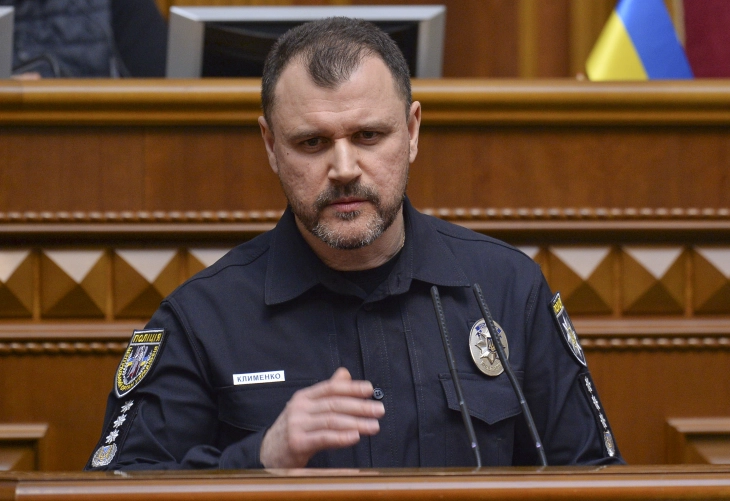Moscow targets 118 sites in Ukraine, in biggest attacks since January
- Russia has subjected Ukraine to the most widespread shelling since the beginning of the year during the past 24 hours, according to Ukrainian Interior Minister Ihor Klymenko.

Kiev, 1 November 2023 (dpa/MIA) - Russia has subjected Ukraine to the most widespread shelling since the beginning of the year during the past 24 hours, according to Ukrainian Interior Minister Ihor Klymenko.
Moscow had attacked an overall 118 localities in 10 Ukrainian regions, Klymenko wrote on Telegram on Wednesday. According to the authorities, at least four people have been killed and 14 injured.
In Kherson in southern Ukraine, a Russian projectile struck close to residential buildings on Wednesday morning, killing a city administration employee.
Two of her colleagues also sustained injuries, some of which were serious, according to the local military authorities.
Video footage released by officials at the scene suggests a drone attack took place, given the severity of the blast damage and the suspected impact crater.
A Russian drone also killed a 59-year-old woman and injured six others in the Dnipropetrovsk region north-east of Kherson, according to the regional prosecutor's office.
Other victims were registered earlier in the east and north-east of the country.
In the embattled Donetsk region, Russian shelling killed a 58-year-old man and wounded four others, according to regional authorities.
Another man was killed and one wounded near the front-line town of Kupyansk in the north-east of the country, which was liberated last year, according to Ukraine's interior minister.
In central Ukraine, a Shahed drone - also known as a kamikaze drone - hit a refinery at dawn, causing a fire.
The fire was quickly extinguished and the plant has been shut down, the military governor of the Poltava region, Filip Pronin, wrote on Telegram. He said no one was injured.
Even before the arrival of the first Western F-16 fighter jets in Ukraine, Russian Defence Minister Sergei Shoigu spoke of shooting them down within three weeks.
In the past month, Russian air defences have "shot down more than 1,400 air attack objects of the enemy, including 37 aircraft and six ATACMS tactical missiles," Shoigu said at a ministry meeting on Tuesday. At this rate, the F-16 fighter jets would be destroyed within 20 days, he said.
It is not possible to independently verify Shoigu's claims about past shootdowns. So far, however, the Russian military has repeatedly exaggerated its own successes.
By its own count, the Russian Defence Ministry has shot down more than 500 Ukrainian aircraft - more than the neighbouring country has ever possessed, even with deliveries of old MiG and Sukhoi fighter jets from allies, especially in Eastern Europe.
Ukraine has also been demanding Western fighter jets for months in order to better defend itself against the Russian invasion.
So far, there are commitments to deliver F-16s from Denmark and the Netherlands to Ukraine. The first aircraft are due to arrive in Romania, which borders Ukraine, for pilot training in the next few weeks.
Russia has been waging a full-scale war against Ukraine for more than 20 months. Russian drone, missile and artillery attacks repeatedly kill civilians.
As a result of the conflict, some 18 million people are currently in need of some form of humanitarian assistance, United Nations Office for the Coordination of Humanitarian Affairs (OCHA) Director Ramesh Rajasingham told the UN Security Council in New York on Tuesday.
Ukraine's statistics office, as well as the EU statistics agency Eurostat, put the population before the war at around 41 million. After the war began, large parts of the country were occupied by the Russian army and millions of people left the country. Some have since returned, making it hard to calculate exactly how many people are currently living in the country.
"While much international attention is rightly concentrated on the grave events in the Middle East, it is important that we do not lose focus on other crises, particularly not one as brutal and far-reaching as that precipitated by the war in Ukraine," Rajasingham said. "Indeed, this is more so as the conflict continues to inflict unimaginable levels of suffering."
Critical infrastructure had suffered considerable damage, putting people's supplies of electricity, water, heating and telecommunications at risk. In view of the approaching winter, with temperatures expected to drop to minus 20 degrees Celsius, this is a cause for particular concern, he said.
Despite all the risks, more than 500 aid organizations, most of them local, were working in the first nine months of 2023 to supply 9 million people with essential goods, thanks to international aid funds, Rajasingham said.
Photo: MIA archive







